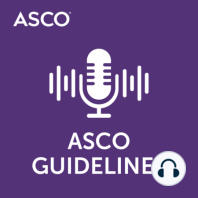11 min listen
Management of Cancer Cachexia Guideline
FromASCO Guidelines
ratings:
Length:
13 minutes
Released:
May 20, 2020
Format:
Podcast episode
Description
An interview with Dr. Eric Roeland from Massachusetts General Hospital Cancer Center on “Management of Cancer Cachexia: ASCO Guideline.” This guideline provides evidence-based recommendations on the clinical management of cancer cachexia in adult patients with advanced cancer. Recommendations are made on both pharmacologic and nutritional interventions. Read the full guideline at www.asco.org/supportive-care-guidelines The purpose of this podcast is to educate and to inform. This is not a substitute for professional medical care and is not intended for use in the diagnosis or treatment of individual conditions. Guests on this podcast express their own opinions, experience, and conclusions. The mention of any product, service, organization, activity, or therapy should not be construed as an ASCO endorsement. Hello and welcome to the ASCO Guidelines Podcast Series brought to you by the ASCO Podcast Network, a collection of nine programs covering a range of educational and scientific content and offering enriching insight into the world of cancer care. You can find all the shows including this one, at podcast.asco.org. My name is Brittany Harvey, and today I'm speaking with Dr. Eric Roland from Massachusetts General Hospital Cancer Center. Lead author on Management of Cancer Cachexia, ASCO Guideline. Thank you for being here, Dr. Roland. Well thank you very much. Before we get into the content of this guideline, I want to note that all conflict of interest disclosure information for the expert panel is available online with the publication of the guideline in the Journal of Clinical Oncology. Dr. Roland, do you have any conflicts of interest to disclose? Yes, within the last two years, I've served as a consultant for Asahi Kasei Pharmaceuticals, DIG Consulting, Napo Pharmaceuticals, American Imaging Management, Immuneering Corporation, and Prime Oncology. I've also served on advisory boards for Herron Pharmaceuticals and Vector Oncology. And I serve as a member on the Data Safety Monitoring Boards for Oragenics, Kalyra Pharmaceuticals, and [INAUDIBLE] Life Sciences Pharmaceutical Company. Thank you. Then first, can you give us a general overview of what this guideline covers? Sure. We performed a systematic review of the literature regarding available evidence for nutritional and pharmacologic interventions for cancer cachexia. Specifically, we searched PubMed and the Cochrane Library for randomized controlled trials and systematic reviews published between 1966 in 2019. We focused our review on adult patients with advanced or incurable cancer. And given the highly variable nature of cancer cachexia, we specifically evaluated the endpoints of loss of appetite or anorexia, body weight, and lean body mass, or skeletal muscle. Our targeted audience included clinicians as well as patients and caregivers. Can you provide us with a little background on cancer cachexia? Yes, first I think it's incredibly important for us to define cancer cachexia, especially given its prevalence in cancer care. Traditionally, cancer cachexia has been defined as a certain amount of weight loss over a defined time period. However, cachexia is much more complicated than weight loss alone. It is a multifactorial syndrome characterized by loss of appetite, weight, and skeletal muscle, which leads to fatigue, functional impairment, increased treatment related toxicity, poor quality of life, and even reduced survival. And as clinicians, we need to try to identify any reversible causes contributing to cachexia and treat them. This of course, includes treating the underlying cancer when possible. Additionally, it's essential for patients to receive optimal palliation of all symptoms that may be interfering with the intake of calories, such as pain, nausea, vomiting, constipation, diarrhea, and depression. Therefore, as clinicians, we need to work in teams of experts that might include expertise in pain, palliative care, nutrition, physical occupatio
Released:
May 20, 2020
Format:
Podcast episode
Titles in the series (100)
Early Detection for Colorectal Cancer Resource-Stratified Guideline: An interview with Dr. Marcia Cruz-Correa from the University of Puerto Rico and MD Anderson Cancer Center on the ASCO Resource Stratified Guideline on early detection for colorectal cancer. The purpose of this podcast is to educate and to inform. This... by ASCO Guidelines
